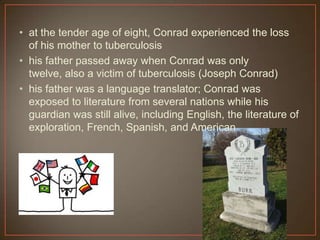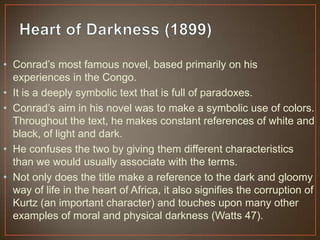Joseph Conrad
- 2. • Born Józef Teodor Konrad Korzeniowski on December 03, 1857 in Berdichev (formerly Poland), Ukraine • Parents: Apollo Korzeniowski and Ewa (nee Bobrowska) • Conrad‟s early childhood is described as being rather harsh • When he was only three, his father was imprisoned in Warsaw for his supposed revolutionary political affiliations (Knowles 4-5)
- 3. • at the tender age of eight, Conrad experienced the loss of his mother to tuberculosis • his father passed away when Conrad was only twelve, also a victim of tuberculosis (Joseph Conrad) • his father was a language translator; Conrad was exposed to literature from several nations while his guardian was still alive, including English, the literature of exploration, French, Spanish, and American
- 4. • at the age of twelve, Conrad was placed under the care of his maternal uncle, Tadeusz Bobrowski, who introduced a new approach to life to the young boy • Instead of the revolutionary beliefs that Conrad was accustomed to from his father, he was instead implanted with ideas of conservatism, or strict social discipline. • He “always disliked the Christian religion, its doctrines, ceremonies, and festivals” (Knowles 6-7)
- 5. • On September 26, 1874, Conrad left Poland for Marseilles to become a seaman (Najder xix). • In the subsequent years ahead, it was reported from Conrad‟s uncle that the youth attempted suicide after setbacks with his status as a seaman among the French, and losing his money in a failed smuggling expedition, along with foolish gambling (Knowles 8).
- 6. • In 1878, Conrad yet again underwent a drastic change in his life when he made his first contact with the British Merchant Service (Knowles 8). • On July 11, he joined his first British ship, the Skimmer of the Sea (Najder xix). Sea-life with the British Merchant Service reminded Conrad of home, since many of his fellow sailors had a strong foundation in values such as fidelity and solidarity, strict class divisions were an integral part of the environment, and a system of established traditions was introduced (Knowles 8). • In August of 1886 he became a British subject, and later in the year, passed his examination for Ordinary Master of the British merchant marine (Najder xix).
- 7. • Joseph Conrad‟s visit to the Belgian Congo from 1890-1894 had both positive and negative effects on his life. • The positive aspect of the voyage was the fact that he was able to write a famous novel filled with chilling commentary about his daily experiences among the natives of the Congo. • On the other hand, while in the Congo he underwent a physical and mental breakdown that would affect his health for the rest of his life. • When Conrad returned from the Congo to resettle in London, his mind and thoughts were fragmented, and he went into exile for several reasons, including political, aesthetic, and personal (Karl 308). Thus, Conrad ended a sea career that spanned twenty years, from which he was able to achieve success in imaginative fiction writing (Knowles 8-9).
- 8. • THREE MAJOR PERIODS: 1. Getting accustomed to a literary culture that was still strange to him. - first two novels, Almayer‟s Folly and An Outcast of the Islands - settings in the Far East established his reputation for exotic fiction, which paralleled the likes of Robert Louis Stevenson and Rudyard Kipling (Knowles 11).
- 9. 2. Major phase - began in 1897 with his novel, The Nigger of the Narcissus; full of detail and it represents his "in between" position as a writer - During the years from 1898 to 1902, Conrad became a family man with the birth of his son, but this time period is also arguably the most prolific part of his career - During this time, he continued his struggle to negotiate with his English cultural identity and audience with novels such as Youth, Lord Jim, and Heart of Darkness. - In each novel, Conrad used the character Marlow to find an English identity and voice among other things (Knowles 11- 13).
- 10. • Conrad‟s most famous novel, based primarily on his experiences in the Congo. • It is a deeply symbolic text that is full of paradoxes. • Conrad‟s aim in his novel was to make a symbolic use of colors. Throughout the text, he makes constant references of white and black, of light and dark. • He confuses the two by giving them different characteristics than we would usually associate with the terms. • Not only does the title make a reference to the dark and gloomy way of life in the heart of Africa, it also signifies the corruption of Kurtz (an important character) and touches upon many other examples of moral and physical darkness (Watts 47).
- 11. 3. Dark phase • Heart of Darkness (1899), Lord Jim (1899- 1900), Nostromo (1904) explores man‟s vulnerability and corruptibility • Heart of Darkness - the dark and gloomy way of life in the heart of Africa, it also signifies the corruption of Kurtz (an important character) and touches upon many other examples of moral and physical darkness (Watts 47). • Lord Jim - offers the reader a glimpse of the tragic faults of mankind when he includes bloodthirsty pirates as essential characters in the plot.
- 12. • Nostromo - seemed to base this novel on his own personal experiences in the Caribbean ports and Venezuela when he was a teenager - also seems to be about imperialist aims, as Conrad employs one of his most suggestive symbols, the silver mine (Hay 82-83) - "In the story, the Italian Nostromo („our man‟) is destroyed for his appetite for adventure and glory, but with his death the secret of the silver is lost forever" (Joseph Conrad).
- 13. • The last years of his life were painful in that he suffered from rheumatism. • Similar to when he was offered honorary degrees from five universities, he refused an offer of knighthood in 1924 • Conrad died of a heart attack on August 3, 1924 and was buried in Canterbury (Joseph Conrad)
- 14. • Conrad‟s literature was consistent with his gloomy nature, which was predominantly a result of his early experiences as a child and his own disordered young manhood. • Basically, all of his novels were filled with dark irony, so even if they ended well, Conrad‟s method of storytelling made the tale seem disturbing. • Conrad‟s odd way of using oblique symbolism was both his greatest strength and weakness
- 15. • Hay, Eloise Knapp. "Nostromo." The Cambridge Companion to Joseph Conrad. Ed. J.H. • Heart of Darkness: A Hypertext Annotation. Stockton.edu. 27 Nov 2003. Web. 13 Jun 2013. http://loki.stockton.edu/~kinsellt/projects/hod/bio.html. • Joseph Conrad. 2000. 6 Nov. 2003. http://www.kirjasto.sci.fi/jconrad.htm. • Knowles, Owen. "Conrad‟s Life." The Cambridge Companion to Joseph Conrad. Ed. J.H. • Najder, Zdzislaw. Joseph Conrad, A Chronicle. New Jersey: Rutgers University Press, 1983.
Editor's Notes
- The apparent symbolism linked between Conrad’s childhood as an orphan and his later fiction is illustrated when he describes life as being a solitary ordeal and compares it to a nightmare (Knowles 6).
- The aforementioned contrasting ways of life which Conrad experienced as a youngster contributed to his "awareness of himself as homo duplex, suspended between revolutionary and conservative, chivalric and egalitarian, romantic and pragmatic traditions“However, one important decision that Conrad made under the tutelage of his uncle which contrasted with the beliefs of his family was the fact that from the age of fourteen, he "always disliked the Christian religion, its doctrines, ceremonies, and festivals" (Knowles 6-7).
- 1. was mature beyond his years and a great writer















